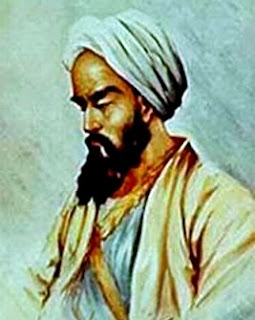 |
| Zakariya Razi |
Abu Bakr prophet Ibn Zakariya Razi (864-930 A.D.) was born at Ray, Iran. Initially, he was fascinated by music however later on he learnt medication, arithmetic, astronomy, chemistry and philosophy from a student of Hunayn Ibn Ishaq, World Health Organization was well versed in the ancient greek, Persian and Indian systems of medication and different subjects. He additionally studied under Ali Ibn Rabban. the practical expertise gained at the well-known Muqtadari Hospital helped him in his chosen profession of medication. At Associate in Nursing early age he gained eminence as Associate in Nursing professional in medication and alchemy, in order that patients and students flocked to him from distant elements of Asia.
He was first placed in-charge of the first Royal Hospital at Ray, from where he before long affected to an identical position in baghdad where he remained the top of its famous Muqtadari Hospital for along time. He affected from time to time to varied cities, particularly between Ray and baghdad, however finally came to Ray, where he died around 930 A.D. His name is commemorated in the Razi Institute close to Iranian capital.
Razi was a Hakim, Associate in Nursing alchemist and a philosopher. In medication, his contribution was so vital that it will solely be compared to it of Ibn Sina. some of his works in medication e.g. Kitab al- Mansoori, Al-Hawi, Kitab al-Mulooki and Kitab al-Judari American state al-Hasabah earned everlasting fame. Kitab al-Mansoori, that was translated into Latin in the 15th century A.D., comprised ten volumes and dealt thoroughly with Greco-Arab medication. some of its volumes were published separately in Europe. His al-Judari wal Hasabah was the first written material on pox and chicken pox, and is essentially based on Razi's original contribution: it had been translated into varied European languages. Through this written material he became the first to draw clear comparisons between pox and chicken pox. Al-Hawi was the largest medical encyclopedia composed by then. It contained on every medical subject all-important information that was obtainable from Greek and Arab sources, and this was concluded by him by giving his own remarks based on his expertise and views. A special feature of his medical system was that he greatly favoured cure through correct and controlled food. This was combined with his stress on the influence of psychological factors on health. He additionally tried planned remedies first on animals so as to evaluate in their effects and facet effects. He was additionally Associate in Nursing professional medico and was the first to use narcotic for physiological condition.
In addition to being a MD, he compounded medicines and, in his later years, gave himself over to experimental and theoretical sciences. It appears attainable that he developed his chemistry independently of Jabir Ibn Hayyan. He has pictured in nice detail many chemical reactions and additionally given full descriptions of and designs for about twenty instruments employed in chemical investigations. His description of chemical data is in plain and plausible language. one among his books calledKitab-al-Asrar deals with the preparation of chemical materials and their utilization. Another one was translated into Latin under the name Liber Experimentorum, He went on the far side his predecessors in dividing substances into plants, animals and minerals, thus during a way gap the way for inorganic and chemical science. By and huge, this classification of the three kingdoms still holds. As a chemist, he was the first to provide oil of vitriol at the side of some other acids, and he additionally prepared alcohol by fermenting sweet product.
His contribution as a philosopher is also standard. the essential elements in his belief area unit the creator, spirit, matter, house and time. He discusses their characteristics well and his ideas of house and time as constituting a continuum area unit outstanding. His philosophical views were, however, criticised by a number of different Muslim scholars of the time.
He was a prolific author, World Health Organization has left monumental treatises on numerous subjects. He has over 200 outstanding scientific contributions to his credit, out of that about half upset medication and 21-concern alchemy. He additionally wrote on physics, arithmetic, uranology and optics, however these writings could not be preserved. a number of his books, includingJami-fi-al-Tib, Mansoori, al-Hawi, Kitab al-Jadari American state al-Hasabah, al-Malooki, Maqalah fi al- Hasat fi Kuli American state al-Mathana, Kitab al-Qalb, Kitab al-Mafasil, Kitab-al- 'Ilaj al-Ghoraba, Bar al-Sa'ah and al-Taqseem American state al-Takhsir are published in varied European languages. about forty of his manuscripts area unit still extant in the museums and libraries of iran, Paris, Britain, Rampur, and Bankipur. His contribution has greatly influenced the event of science, in general, and medication, specifically.





